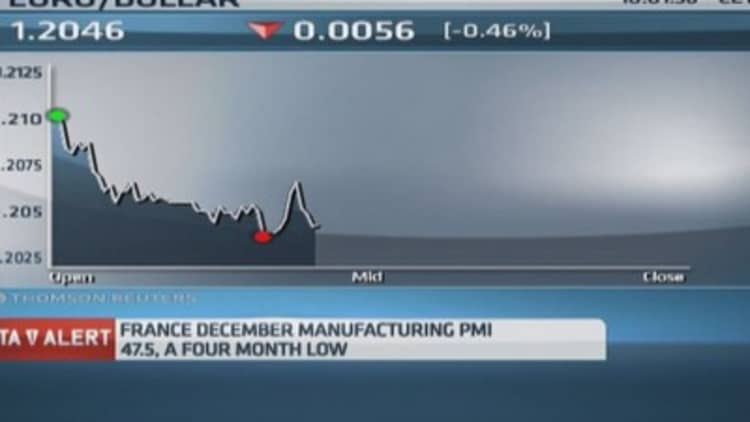
Euro zone manufacturing remained subdued in December, according to data out on Friday, marking an end to a year of widespread concerns about the health of the currency union's economy.
The widely-followed Markit Manufacturing Purchasing Managers' Index (PMI) came in at 50.6 this month, slightly below a flash estimate of 50.8, but above November's 16-month low of 50.1. A figure over 50 marks expansion in the sector.
In a release accompanying the data, Markit said industry remained "near-stagnant".
"Euro zone factory activity more or less stagnated again in December, rounding off a year which saw an initial, promising-looking upturn fade away and stall in the second half of the year," Chris Williamson, chief economist at Markit, said in a note.
"The weakness of factory output, combined with the subdued service sector growth signalled by the flash PMI, suggests the eurozone economy grew by just 0.1 percent in the fourth quarter."
Read MoreEurope deflation fears are back after weak data
On a country-by-country basis, France's manufacturing sector shrunk at its fastest pace in four months in December, with a Markit PMI reading of 47.5. Manufacturing also shrunk in December in Italy, with a 19-month low figure of 48.4.
Germany's figure was in line with earlier flash estimates at 51.2, as more new orders helped lead a return to growth.
Howard Archer, chief European economist at IHS Global Insight, said the data did little to ease pressure on the European Central Bank (ECB) to unveil further stimulus measures in an effort to boost the euro zone's economy "sooner rather than later."
"The euro zone is clearly currently having real trouble in developing even modest growth momentum," Archer said in a research note on Friday.
"We think the odds now strongly favor the ECB engaging in quantitative easing in the first quarter of 2015, with the odds just about favoring a move in January rather than March."
A number of economists now expect ECB chief Mario Draghi to announce a full-blown government bond-buying program—known as quantitative easing—at its next policy meeting.
On Friday, Draghi reiterated the central bank's readiness to introduce further stimulus measures, early this year if necessary. In an interview with German financial newspaper Handelsblatt, he said that the risk of the central bank not fulfilling its mandate of preserving price stability was higher now than six months ago, Reuters reported.


